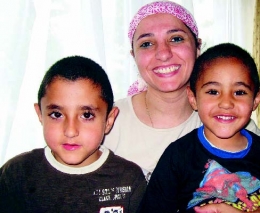A LUCAN-BASED woman threatened by both sides of the Israeli-Palestinian conflict has spoken of her joy at being allowed stay in Ireland. Mother-of-two Sawsan Mo-hammed, at risk from Israeli attacks on Gaza and who also faced threats from Palestinian militant group Hamas, was recently granted a rare form of protection by the Department of Justice.
“I’m so happy,” she told Metro Éireann, “not for me but for the children.”
Her sons Ali (6) and Omar (3) spent nearly four years with their mother at the Mosney asylum seeker centre in Co Meath, which Mohammed described as “like a prison”. She said the nightmares she suffered at the camp have subsided since her move to Lucan.
Originally from Beit Hanoun, a town in northern Gaza from which Palestinian militants regularly launch rockets at Israel, Mohammed said attacks from Israeli forces often cause death and injury to civilians.
“Every day in Beit Hanoun a lot of children die, every day if I show you the news now, it’s very bad,” she said.
As an unmarried mother, Mohammed further said she was at risk from Hamas, a Palestinian nationalist group which promotes Islamic fundamentalism. Classified as a terrorist organisation by the EU, it has governed the Palestinian Territories since its 2007 election win, and has been accused of increasingly forcing an Islamist agenda onto Palestinians.
Mohammed, who came to Ireland via London due to alleged unforeseen circumstances, was refused refugee status here – but through legal assistance from Terence Lyons and Co solicitors in Dublin, she has become a rare grantee of subsidiary protection, a status accorded to those at risk of serious harm in their home country.
The Palestinian woman submitted her application for subsidiary protection in November 2006, shortly after it came into Irish law under an EU directive. But with no decision on her case, she went to court this year and was granted leave for a judicial review. The Department of Justice granted her subsidiary protection in July.
Legal experts have suggested a number of reasons why Mohammed’s case was one of only 25 successful applications out of over 4,000 submitted to date (some 3,229 are currently “pending”, according to the Department of Justice).
Israel’s attacks on the Gaza Strip during December and January last may have influenced the decision, according to one legal source familiar with Mohammed’s case.
The submission of up-to-date country-of-origin information by her legal team bolstered the Palestinian woman’s argument, he suggested, but Mohammed also had “an almost unique set of circumstances”, being at risk from both sides of the Israeli-Palestinian conflict.
“With regard to Hamas, there was a lot of evidence to suggest she’d face extreme discrimination or worse – torture, extreme violence,” he said.
The source added that failed asylum applicants often don’t realise that submitting “rehashed” versions of their asylum claims will get them nowhere. A successful subsidiary protection application will require new information, such as clear evidence that the situation in their country-of-origin has deteriorated.
According to legal experts, a key difference between refugee status and subsidiary protection is that the former must relate to a specific threat, whereas the latter can include being a likely target of indiscriminate violence.
According to a Department of Justice spokesperson, it was not possible to supply Metro Éireann with the nationalities of successful subsidiary protection applicants as it “could lead to the identification of individual applicants”.
Since its introduction in September 2006, some 1,503 applicants have been from Nigeria, followed by 230 from DR Congo. Applicants from Iraq do not feature in the top ten.
Meanwhile, Sawsan Moham-med says she hopes to work in office management – but ack-nowledges that finding a job will be tough. “I can do work, I like to do work – but a lot of people are without work.”
Mohammed adds that she “still can’t believe” her Mosney days are behind her, and refuses to visit the centre – in case she can never escape.












